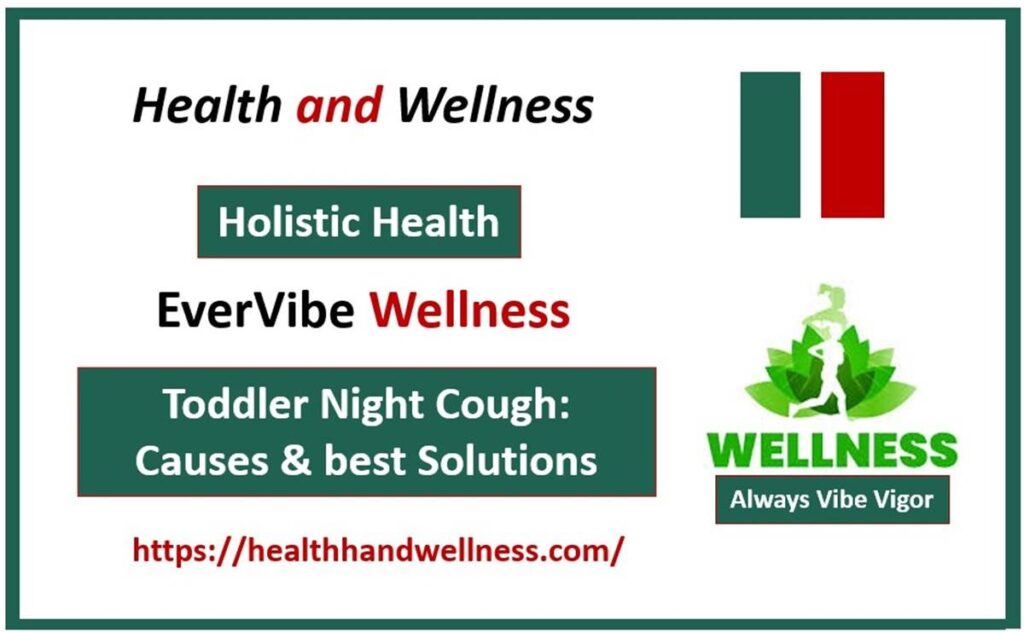Toddler Night Cough can be concerning for parents as it disrupts their child’s sleep and may indicate underlying health issues. This article explains the causes, solutions, and preventive measures for toddler night cough, offering expert tips for worried parents.
Introduction
Nighttime coughing in toddlers is a common yet worrisome problem for parents. It can wake your little one from a deep sleep and leave you wondering what’s wrong. Is it just a common cold, or could it be something more serious? While most cases are manageable at home, understanding the root cause of the cough is essential for finding the right solution.
In this article, we’ll explore the common causes of toddler night cough, the best ways to address it, preventive measures, and expert tips to ensure your child sleeps peacefully through the Toddler Night Cough.

Understanding Toddler Night Cough
Nighttime coughing refers to a persistent cough that occurs mostly or exclusively at night, disturbing your toddler’s rest. This can be occasional or chronic, depending on the underlying cause.
Coughing is the body’s natural defense mechanism to clear the airways, but when it becomes frequent during sleep, it can indicate irritation or infection in the respiratory system. Identifying whether the cough is dry, wet, or barking can also help determine its cause and treatment.
Common Causes of Toddler Night Cough
- Common Cold or Viral Infection
Nighttime coughing often occurs due to mucus dripping down the throat, especially during a cold or viral illness. Toddlers are more prone to colds due to their developing immune systems. - Postnasal Drip
Allergies or sinus infections can cause mucus to accumulate in the throat, leading to coughing while lying down. Toddler Night Cough - Asthma
For some toddlers, asthma symptoms, like coughing and wheezing, worsen at night. If your child has difficulty breathing or a persistent nighttime cough, consult a pediatrician. - Allergies
Environmental allergens like dust mites, pet dander, or pollen can trigger coughing in toddlers. Allergic reactions often intensify at night when the child is in close contact with bedding or carpets. - Gastroesophageal Reflux Disease (GERD)
GERD, a condition where stomach acid flows back into the esophagus, can cause a nighttime cough due to irritation of the throat and airways. - Croup
Croup is a viral infection that leads to a barking cough, hoarseness, and difficulty breathing. It typically worsens at night. Toddler Night Cough - Whooping Cough (Pertussis)
If your toddler is unvaccinated or partially vaccinated, whooping cough can cause severe bouts of coughing, often accompanied by a “whooping” sound.
Best Solutions for Toddler Night Cough
- Use a Humidifier
Dry air can irritate the throat and exacerbate coughing. A cool-mist humidifier adds moisture to the air, soothing your toddler’s airways and reducing coughing. - Elevate Your Toddler’s Head
Prop up your toddler’s upper body with a pillow or incline their mattress slightly to prevent mucus from pooling in the throat. - Honey (for Toddlers Over 1 Year)
Honey has natural antibacterial properties and soothes the throat. Give your child a teaspoon of honey before bedtime for relief. - Keep the Air Clean
Minimize exposure to dust, smoke, and other irritants. Regularly wash bedding, vacuum carpets, and avoid using strong-scented cleaning products. - Stay Hydrated
Encourage your toddler to drink warm fluids like herbal tea or water throughout the day to keep mucus thin and manageable. - Steam Therapy
Sitting in a steamy bathroom for 10-15 minutes before bed can help loosen mucus and ease breathing. - Over-the-Counter Remedies (with Doctor’s Approval)
Saline nasal sprays or drops can help clear nasal congestion. Avoid giving your toddler cough suppressants without consulting a doctor. - Consult a Pediatrician
If the cough persists for more than a week, worsens, or is accompanied by fever, seek medical advice promptly.
Preventing Night Cough in Toddlers
- Improve Air Quality
Invest in an air purifier for your toddler’s room to reduce allergens and irritants. - Allergy Management
If your toddler is prone to allergies, keep their room allergen-free by using hypoallergenic bedding and keeping pets out of the bedroom. - Avoid Overheating the Room
Keep the bedroom cool and comfortable. Overheating can dry out the air, leading to throat irritation. Toddler Night Cough - Boost Immunity
Ensure your toddler has a balanced diet rich in vitamins and minerals, sufficient sleep, and regular physical activity to strengthen their immune system. - Vaccinations
Stay up to date on your child’s vaccinations to prevent illnesses like whooping cough and the flu. - Regular Cleaning
Wash your toddler’s hands frequently, especially during cold and flu season, to minimize exposure to germs.
Expert Tips for Parents
- Stay Calm
Night coughs can be stressful, but remaining calm helps your toddler feel reassured. - Keep a Cough Diary
Track when the cough occurs and any accompanying symptoms. This information can be invaluable for your pediatrician. - Limit Dairy Before Bed
Dairy can thicken mucus in some toddlers, so avoid giving them milk or cheese right before bedtime. - Dress Comfortably
Dress your toddler in breathable, comfortable clothing to ensure they are neither too hot nor too cold at night. - Monitor for Warning Signs
Seek immediate medical attention if your toddler has difficulty breathing, high fever, bluish lips, or prolonged coughing fits.
Toddler night coughs, while common, can disrupt sleep for both your child and your family. By understanding the underlying causes and implementing practical solutions, you can help your toddler feel better and sleep soundly.
Remember, if the cough persists or worsens, always consult a healthcare professional for proper evaluation and treatment. Being proactive and attentive to your child’s needs will ensure they remain healthy and happy, even through those challenging cough-filled nights.